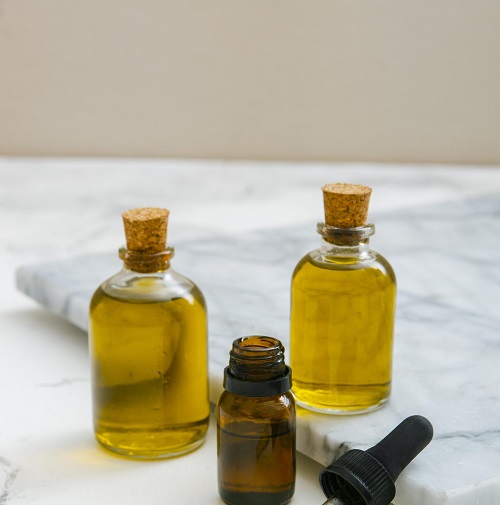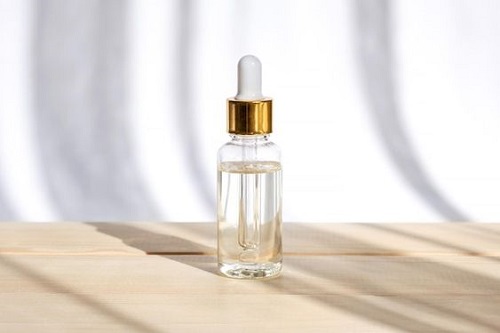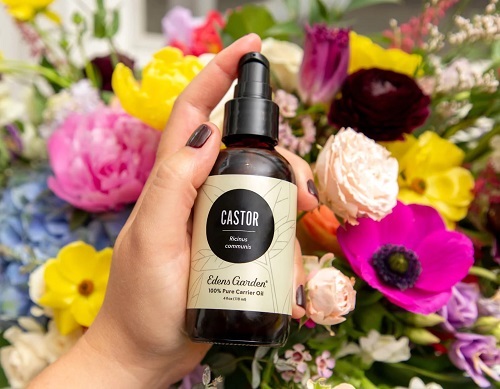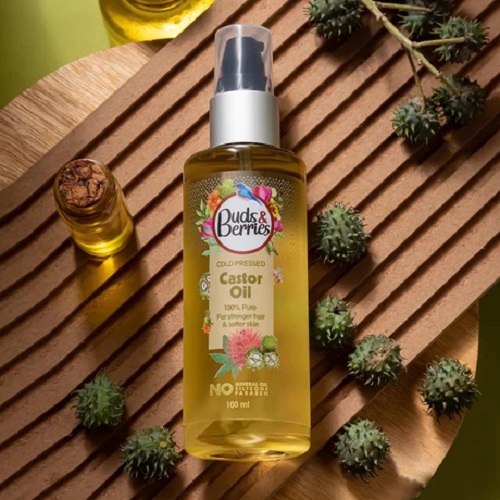Is Mineral Oil The Same As Castor Oil? Can they be used interchangeably? Or are they distinct compounds? Let’s learn below!
If you’re a dedicated advocate of natural skincare and prioritize a holistic approach to wellness, you’ve likely pondered the question—Is Mineral Oil The Same As Castor Oil? To unravel this query and provide you with a comprehensive understanding, we’ve prepared an informative guide that explores the specifics of these oils while offering a comparative study to clear any confusion.
Explore the Benefits of Castor Oil Pack For Back Pain here
Understanding Mineral Oil
1. Origin
Mineral oil is a byproduct of the petroleum distillation process. It emerges as a clear, odorless, and colorless liquid, sourced from the depths of the Earth’s mineral reservoirs.
2. Texture
Its texture is remarkably lightweight, and it possesses a non-comedogenic nature, which essentially means it’s unlikely to clog pores. This quality makes it a preferred base ingredient in numerous skincare products, courtesy of its smooth and easily spreadable consistency.
3. Hydration
Mineral oil excels in its role as an exceptional emollient. It can form a protective seal on the skin’s surface, effectively trapping moisture within. Consequently, it emerges as a go-to choice for individuals seeking to combat skin dryness or those with sensitive skin.
4. Barrier Function
This oil performs the vital function of creating a protective barrier on the skin. In doing so, it acts as a shield, safeguarding the skin from the harsh external elements that constantly assail it. This barrier function significantly aids in reducing the loss of moisture from the skin’s surface, rendering it an efficient moisturizing agent.
Is Castor Oil Effective for Knee Pain? Learn here
Understanding Castor Oil
1. Origin
Castor oil hails from the castor bean plant, scientifically known as Ricinus communis. It boasts a distinctive, somewhat earthy aroma and appears as a thick, pale yellow liquid.
2. Texture
In stark contrast to mineral oil, castor oil carries a thickness and viscosity that set it apart. Its notable viscosity is well-matched with its reputation as a nourishing agent for both skin and hair.
3. Hydration
What distinguishes castor oil is its rich composition, infused with essential fatty acids such as ricinoleic acid. These fatty acids are instrumental in delivering profound moisture to the skin and hair. As such, castor oil is celebrated for its efficacy, particularly among individuals grappling with dry or damaged skin and hair.
4. Healing Properties
The true allure of castor oil lies in its innate capacity for healing. Over centuries, it has been cherished as a natural remedy capable of soothing skin irritations and minor wounds.
Have a glance at Castor Oil for Sinus Headaches here
Is Mineral Oil The Same As Castor Oil?
No, mineral oil and castor oil are not same.
They are two distinct substances with differing compositions and applications. Mineral oil is a colorless and odorless liquid derived from petroleum, primarily composed of hydrocarbons. It finds common use as a lubricant in various industries and as a cosmetic moisturizer.
On the other hand, Castor Oil is a vegetable oil obtained from the seeds of the castor bean plant, featuring a unique triglyceride called ricinoleic acid. This acid gives Castor Oil its distinct properties, making it valuable for medicinal and industrial purposes, including its use as a laxative and in skincare and haircare products.
These oils have distinct characteristics and purposes, making it important to differentiate between them when considering their use.
Castor Oil vs Mineral Oil
1. Castor Oil vs Mineral Oil for Skin Moisturization
- Mineral Oil: Mineral oil is an excellent choice for maintaining skin hydration through its ability to form a protective barrier that retains moisture.
- Castor Oil: Castor oil excels in deep, intensive moisturization, nourishing the skin to foster a soft and supple complexion.
2. Castor Oil vs Mineral Oil for Hair Care
- Mineral Oil: Frequently found in hair products, mineral oil is valued for its lightweight texture and hydrating properties, making it ideal for dry hair.
- Castor Oil: Proven to nourish both hair and scalp, stimulating hair growth, and serving as a formidable candidate for hair masks.
3. Castor Oil vs Mineral Oil for Skin Healing:
- Mineral Oil: While it is effective for moisturization, mineral oil lacks significant healing properties and primarily focuses on keeping the skin hydrated.
- Castor Oil: Revered for its natural healing capabilities, castor oil is well-suited for addressing various skin concerns, including soothing irritations and promoting skin repair.
4. Castor Oil vs Mineral Oil for Makeup Removal
- Mineral Oil: A popular choice for makeup removal due to its adeptness at dissolving cosmetics with ease.
- Castor Oil: While castor oil can also be useful for makeup removal, its thickness may render it a less preferable option for some individuals.
5. Castor Oil vs Mineral Oil for Constipation
- Mineral Oil: Mineral oil is a more gentle option. It works by coating the stool and intestinal walls, allowing for smoother passage of stool.
- Castor Oil: Castor oil is known for its potent laxative properties due to ricinoleic acid, which acts as a stimulant for the intestines, promoting bowel movements. However, one must use it cautiously and under guidance due to its strong effects.
6. Castor Oil vs Mineral Oil for Labor Induction
- Mineral Oil: Mineral oil is not recommended for labor induction as it lacks the specific properties needed to stimulate uterine contractions.
- Castor Oil: Castor oil has been used historically to induce labor due to its potential laxative and uterine-stimulating effects. However, its safety and efficacy remain a subject of debate.
7. Castor Oil vs Mineral Oil for Yeast Infection
- Mineral Oil: Mineral oil is not recognized as a treatment for yeast infections. Its primary use is as a lubricant and moisturizer, lacking specific antifungal properties.
- Castor Oil: Castor oil is not typically used to treat yeast infections. While it has anti-inflammatory and antimicrobial properties, it is not considered an effective treatment for yeast overgrowth, and medical treatments are preferred for such conditions.
Learn How to Use Castor Oil for Pinched Nerve here
Conclusion
In conclusion, mineral oil and castor oil, though both falling under the umbrella term of “oils,” are distinctly unique in their properties and, most notably, their applications. Mineral oil, with its lightweight, non-comedogenic nature, is the preferred choice for maintaining skin hydration and creating a protective barrier.
On the other hand, castor oil, with its thick viscosity and impressive healing properties, is the go-to option for deep, intensive moisturization and addressing a range of skin or hair-related concerns.
Whether you are seeking a lightweight moisturizer or a natural healer, both mineral oil and castor oil have their roles to play in the intricate and ever-evolving world of beauty and wellness.
Learn whether Castor Oil is Better in a Glass Bottle or Plastic Bottle here
FAQs
1. Can Castor Oil Be Used For Hair Growth, And How Should It Be Applied?
Yes, castor oil is a popular choice for promoting hair growth. To use it effectively, warm the castor oil slightly, apply it to your scalp, and massage it in. Leave it on for at least 30 minutes washing it out.
2. Is Mineral Oil Safe For Cosmetic Use On The Skin?
Mineral oil is generally safe for cosmetic use on the skin. It is a common ingredient in many skincare products due to its non-comedogenic and hydrating properties.
3. Can Mineral Oil Be Ingested To Relieve Constipation, Similar To Castor Oil?
Mineral oil is occasionally used as a mild laxative for constipation relief, but it should only be ingested under the guidance of a healthcare professional. It’s essential to use it sparingly and cautiously, as excessive consumption of mineral oil can lead to undesirable side effects.
4. Is Mineral Oil The Same Thing As Castor Oil?
No, mineral oil and castor oil are not the same. They are distinct types of oils with different properties and uses. Mineral oil is a clear, lightweight, and odorless oil derived from petroleum. Castor oil, on the other hand, is a thicker, pale yellow oil extracted from the castor bean plant.
5. Is Castor Oil Good For Yeast Infection?
Castor oil is not a recommended treatment for yeast infections. Moreover, yeast infections are caused by an overgrowth of candida, and they typically require antifungal treatments for effective relief.




